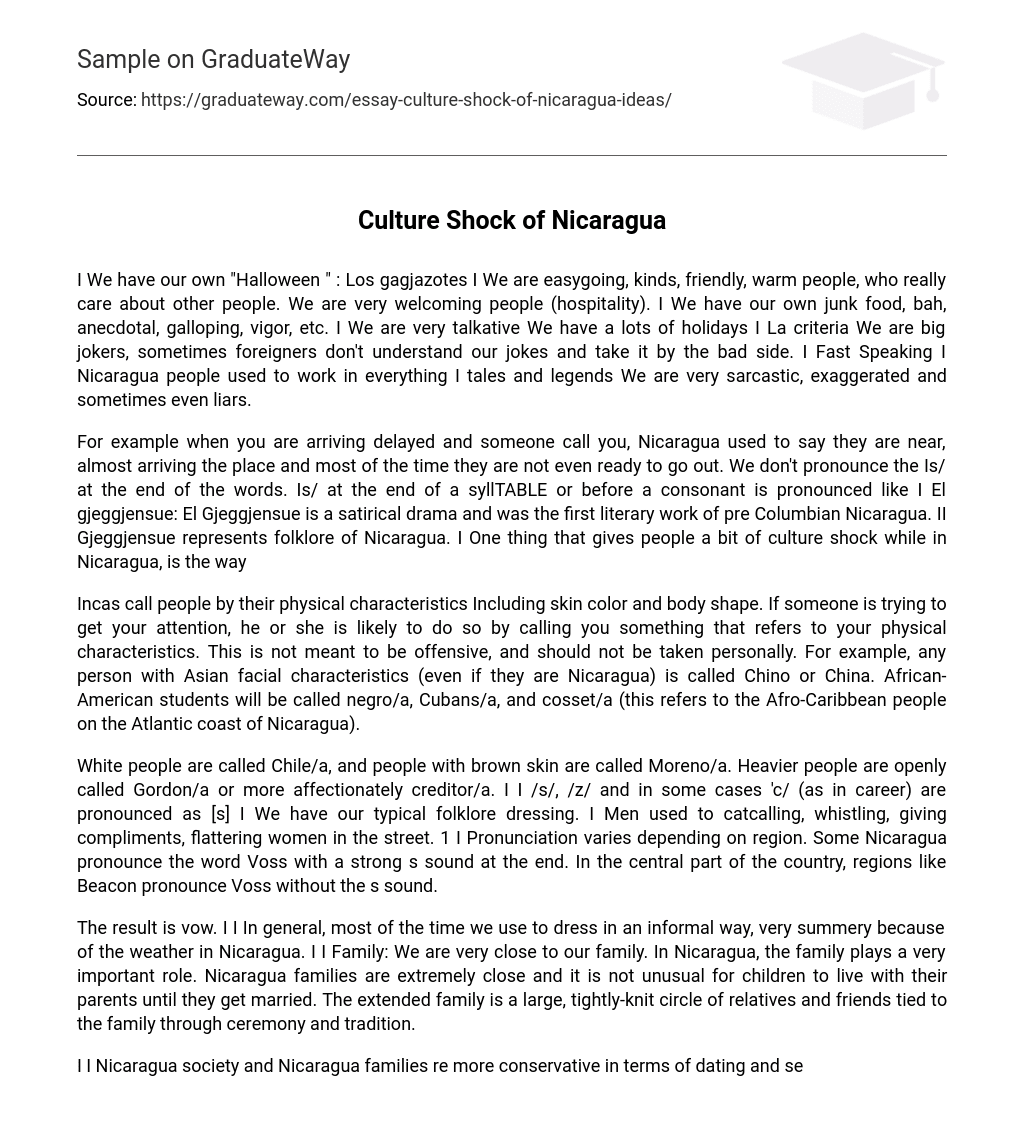I We have our own “Halloween ” : Los gagјazotes I We are easygoing, kinds, friendly, warm people, who really care about other people. We are very welcoming people (hospitality). I We have our own junk food, bah, anecdotal, galloping, vigor, etc. I We are very talkative We have a lots of holidays I La criteria We are big jokers, sometimes foreigners don’t understand our jokes and take it by the bad side. I Fast Speaking I Nicaragua people used to work in everything I tales and legends We are very sarcastic, exaggerated and sometimes even liars.
For example when you are arriving delayed and someone call you, Nicaragua used to say they are near, almost arriving the place and most of the time they are not even ready to go out. We don’t pronounce the Is/ at the end of the words. Is/ at the end of a syllTABLE or before a consonant is pronounced like I El gјeggјensue: El Gјeggјensue is a satirical drama and was the first literary work of pre Columbian Nicaragua. II Gјeggјensue represents folklore of Nicaragua. I One thing that gives people a bit of culture shock while in Nicaragua, is the way
Incas call people by their physical characteristics Including skin color and body shape. If someone is trying to get your attention, he or she is likely to do so by calling you something that refers to your physical characteristics. This is not meant to be offensive, and should not be taken personally. For example, any person with Asian facial characteristics (even if they are Nicaragua) is called Chino or China. African-American students will be called negro/a, Cubans/a, and cosset/a (this refers to the Afro-Caribbean people on the Atlantic coast of Nicaragua).
White people are called Chile/a, and people with brown skin are called Moreno/a. Heavier people are openly called Gordon/a or more affectionately creditor/a. I I /s/, /z/ and in some cases ‘c/ (as in career) are pronounced as [s] I We have our typical folklore dressing. I Men used to catcalling, whistling, giving compliments, flattering women in the street. 1 I Pronunciation varies depending on region. Some Nicaragua pronounce the word Voss with a strong s sound at the end. In the central part of the country, regions like Beacon pronounce Voss without the s sound.
The result is vow. I I In general, most of the time we use to dress in an informal way, very summery because of the weather in Nicaragua. I I Family: We are very close to our family. In Nicaragua, the family plays a very important role. Nicaragua families are extremely close and it is not unusual for children to live with their parents until they get married. The extended family is a large, tightly-knit circle of relatives and friends tied to the family through ceremony and tradition.
I I Nicaragua society and Nicaragua families re more conservative in terms of dating and sexual mores than those of the United States and Europe, because of the strength of tradition and of religious beliefs. I I Greetings: Typically, Nicaragua friends, greet each other and say goodbye with a kiss on the cheek. A handshake is appropriate for professional introductions. I I Space and distance: Incas are less conscientious of personal space than others. Incas stand close and touch frequently during conversation. Nicaragua culture doesn’t stress an importance on punctuality in the same way as other cultures may.





